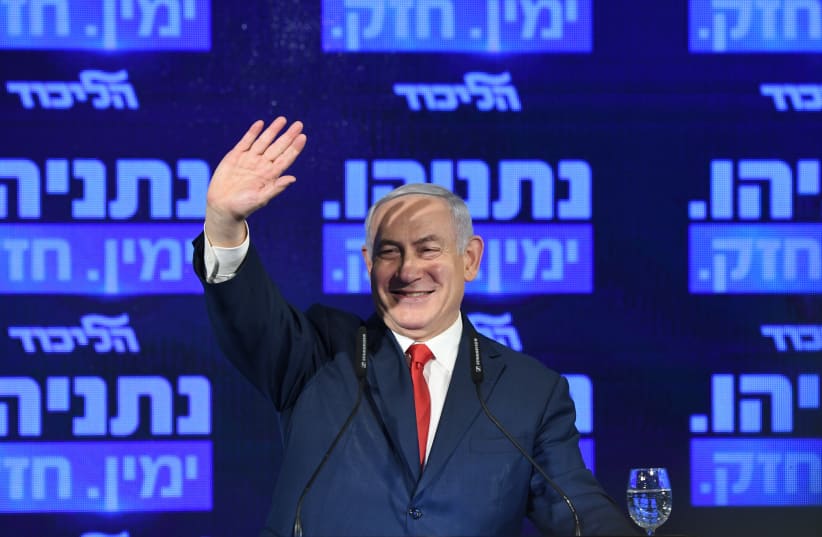“Whoever stays home [on Election Day] or moves to support someone else is voting for [Blue and White number two Yair] Lapid and Gantz, is bringing the Left to power. We can’t let this happen. Only a big Likud will defeat the Left,” he said.
The media, he said, are trying to hide the fact that this election is a choice between “a strong government led by me, or a weak leftist government [led by] Lapid and Gantz.”
Then Netanyahu led the crowd in a chant of “it’s Tibi or Bibi,” referring to Hadash-Ta’al MK Ahmed Tibi.
The prime minister brought up several variations of this theme – that Blue and White are trying to hide that they are truly left wing – including by saying that Gantz and Lapid are wearing costumes in honor of Purim.
Netanyahu mocked Gantz as “bland,” saying that in the Likud “we don’t have [particular] focus groups, because we talk from the heart,” and referred to Gantz not being able to talk without the approval of his public relations flacks.
As for more issue-based remarks, Netanyahu repeated past attacks, including that Blue and White’s leadership is in favor of uprooting the settlements, oppose the Nation-State Law – drafted by a Likud MK, Netanyahu noted proudly – opposed a southern border wall and have Histadrut Labor Union secretary-general Avi Nissenkorn in a senior position on their list.
He also mentioned that in 2015, Gantz attended a memorial concert for Palestinians and Israelis killed during Operation Protective Edge, pointing out that among the Palestinians there were about 1,000 Hamas terrorists.
“He sat in the front row,” Netanyahu said of Gantz. “That says a lot.”
Netanyahu also scoffed at Gantz, claiming he once said that Iran won’t attain a nuclear weapon because they are a “rational” actor.
“I stood strong against an American government that wanted to evacuate settlements and divide Jerusalem,” he added. “Lapid and Gantz would collapse under 15 minutes of that pressure.”
Netanyahu then thanked US President Donald Trump for his continued support and for moving the US embassy to Jerusalem. Though the event was touted as a presentation of the Likud’s list, it consisted of a 45-minute speech by Netanyahu in which he barely mentioned others in his party.
The prime minister opened by touting his achievements in economics and foreign relations, listing many countries that he has visited and improved relations with as prime minister.
In that list was Afghanistan, leading many to think that Netanyahu may have revealed a previously unknown visit. However, he tweeted soon after his speech: “I meant Azerbaijan, but who knows! Maybe in the next term.”
Netanyahu said that the April 9 elections “will be a difficult battle” because of media bias, and said that Attorney-General Avichai Mandelblit’s intention to indict him is based on “false accusations.”
However, he added, playing on a recurring campaign theme: “Once every four years [voters] have the chance to give a strong response to leftist commentators: You won’t decide – the people will! The people are the sovereign and they will decide!”
Before taking the stage, Netanyahu shook hands with former minister Gideon Sa’ar, even though he actively campaigned against Sa’ar in the Likud primary and has voiced theories that Sa’ar is trying to unseat him as head of the party.
An hour before the speech was set to begin, Central Elections Committee chairman Justice Hanan Melcer ruled that it must be aired with a 10-minute delay.
Also, Mandelblit rejected all attempts on Monday night to disqualify candidates from running for the Knesset or to block parties from running on joint lists, both on the Left and Right ends of the political spectrum. Mandelblit was responding to a petition before the Central Elections Committee, which has the final say. He rejected a petition to disqualify each of the three Arab parties which previously made up the Joint List Party.
Explaining his decision, he said that, even if aspects of the parties’ conduct seemed to run afoul of a law which says candidates can be disqualified from running for the Knesset for supporting armed conflict with Israel or trying to undermine Israel’s Jewishness, the evidence did not meet a “critical mass” necessary to violate the relevant law.
He also struck down a petition to block the union of Bayit Yehudi, National Union and Oztma Yehudit, known as the Union of Right-Wing Parties (URP).
Rejecting the idea that the alliance violated principles of equality, he said there was no Knesset law preventing parties from uniting in order to pass the 3.25% electoral cut-off.
In addition, Mandelblit said an ad by Otzma, which was accused of being racist and of disparaging the IDF’s rules of engagement, could not be banned. He said that even though the content was highly objectionable and factually inaccurate, it did not meet the standard for violating the political advertising laws.
Yonah Jeremy Bob contributed to this report.
